The CBD Expert Series: The Long & Winding Road To Legalization
Combine the heart of an activist with the mind of a lawyer, and what do you get? A force to be reckoned with—a force named Sapphire Blackwood.
Law degree in hand, Sapphire has made waves as a vocal supporter of the LGBTQ community, human rights, and the cannabis movement. She has been a consultant in the cannabis industry for 5 years now, and has watched–and navigated—the rapidly changing legal landscape. Currently, she is a land use consultant for Sapphire Blackwood Consult.
Recently, our own Nick Musica sat down with Sapphire to get her take on what it’s been like to be on the right side of the law in a space that’s still considered to be the “wild, wild west” of modern day policymaking and regulation.
Nick Musica (CBD Oil Review): How did you first get into cannabis?
Sapphire Blackwood (Sapphire Blackwood Consult): I got into the cannabis world in May, 2015, right after I graduated law school. I obtained a job as what I thought would be a part-time gig, so I could study for the bar exam. I loved it so much and I got really involved and started learning as much as I could.
In the next couple months, I realized I hadn't studied at all for the bar, which was about to happen in a month, so I thought I'd postpone it. I just really immersed myself in cannabis consulting, which turned into land use fairly quickly. By October of 2015, Governor Brown signed in medical cannabis as legal by California state law and that really, really changed the game as far as legal licensing and regulations went. That's basically when a big, giant land grab started happening for cannabis businesses and investors looking to get legal.
Then in 2016, I got really involved locally with campaigning for Prop 64 because to a lot of people, that meant changing almost everything we knew about how cannabis was distributed based on Prop 215 law, to eventually become what it is now full legalization in California.

The passing of Prop 215 in 1996 was pivotal, not just for California, but for the nation. Twenty years later, and the Golden State made history again as one of the first to legalize recreational marijuana.
We have open markets and legal dispensaries where we're able to easily purchase product. What that has meant in the last four years is a lot of advocacy and a lot of change in terms of ownership, unfortunately or fortunately for some folks. It's been interesting to see the changes and to see those who have been advocating for years be able to keep ownership in some regard. It's just been a whirlwind all around.
From what you've seen, what’s been the impact on cannabis users?
Some good, some bad. I mean, again, as far as the illegal market, we still see it thriving and that's based on price more than anything.
Obviously, the legal users are heavily taxed. Legal dispensaries have heavy burdens to acquire permits based on local code. They also have the heavy burden of paying a very hefty fee to the state of California before even opening up shop. Then heavy taxes both to the state and local municipalities, which drive up the price of legal cannabis. But, for the end-user, that legal cannabis is heavily tested, and I think the biggest pro of legalizing cannabis for the end-user is all pesticides are removed from any product. I think legalization is very, very good in that it keeps people accountable for the product that they put out for the consumer.
So, even though legal marijuana prices are higher, it’s worth it because the product you’re getting is safer?
Correct. Now, mind you, a lot of what I'm saying is also based on cannabis legislation. I think in the CBD and hemp world, what we've seen because of legalization is a very, very relaxed view of CBD and hemp and a very relaxed and confused enforcement of CBD and hemp. We've seen a prevalence of CBD and hemp stores and products, and I think in this case, generally there is more snake oil in CBD particularly.
As compared to THC?
Right. The trouble is knowing whether it's tested. Is the product safe? Those are the kinds of worries that are able to be regulated in the new, legal marijuana market. Again, with CBD, because of the lax laws, people aren't really sure which CBD is actually “legal” because everyone considers it all to be legal in all 50 states.
So what advice would you give to people who want to safely buy CBD?
Buyer beware, buyer beware. Not all CBD is treated equally.
I think one of the most important things for CBD hemp products is to make sure that it's not just hemp seeds. Hemp seeds have been used in the country for a long, long time in products. These aren't the main component in the new CBD tinctures or oils, or whatever you're using, that have been proven to have neurological benefits and anti-inflammatory benefits.
Hemp seed oil isn't going to be your cure all. I think that's the biggest look-out. Make sure you're actually getting CBD, not just hemp seed oil.
Can you talk more about the benefits of CBD and what that means in terms of the law?
Sure. We have a government patent. It's the most famous patent for cannabis, although there are a variety of them, but it proves that CBD itself through extraction methods is useful as an anti-inflammatory and as a neuroprotectant, meaning that it has had some benefit to folks who have had a brain injury and cognitive memory loss, which is a fantastic breakthrough in science itself.
The reason it upsets so many people is because the Department of Health and Human Services, the federal government, owns this patent. The reason why is because NIDA (National Institute of Drug Abuse) has been the one funding scientific studies on cannabis, and unfortunately, NIDA uses these studies to research the harmful effects.
Yet sometimes, it did let scientists explore some other options. When hemp and CBD protesters started gaining more force in the early 90s, I mean, scientists were right there with them and some lucky guy got his breakthrough in the 90s and he was allowed to do this test and this test was proven effective.
It's as simple as that. That's why the government owns this patent. It does infuriate a lot of activists and I can understand 100% why, but that's basically what happened there. Since the early to mid-90s, we've had this government patent.
When a lot of activists caught wind of this, they use this as a jump off to say CBD is healthy, our government owns a patent on it, why is it still illegal?
We got a lot of NFL players and famous folk coming out, but it was really these mama bears, mothers with sick children, who really started escalating the fight in the 2010s. Mothers in places like Florida, Detroit, and Alabama were angry at their government constituents because their child was being cured with this illegal drug. We have a government patent…it proves that CBD itself through extraction methods is useful as an anti-inflammatory and as a neuroprotectant.
Can you give me some specifics of these mothers’ stories?
Yes. One of my most notable conversations was with a mother from Cork, Ireland. She moved her two-year-old son, Tristan, out here who suffered from daily seizures and she could find no cure for him in Ireland. Some folks had told her about using cannabis out there. She was really involved with the Ireland NORML group and she saved up money, had a Go Fund Me that was super popular.
She moved out to Colorado for a year and used full-spectrum CBD oil on Tristan who was pretty much cured after the year of him being here. That woman went on to go back to Ireland, along with some other mothers, and fought heavily for the government to be able to regulate medical cannabis so her son would be able to have a fruitful life. Fortunately for her, medical cannabis is now legal in Ireland.
What sort of effect did these “mama bears” have on legalization in the states, if any?
Take a story like Rylie’s. Rylie’s face was pretty much reconstructed with cannabis oil when she was a young girl, and she's still a very young girl. I believe she's 12 or 13 years old now, and a very big advocate for cannabis, medical cannabis, specifically. Her and her mother were outspoken voices for the state of Delaware and helped make medical cannabis legal and accessible to children. That law is actually named after her: It's Rylie's law.
We get stories like this where it's so empowering, it's so moving and it's great. It's great that medical cannabis has been highlighted both in the public eye and in the political eye.
A lot of states started passing CBD- and hemp-only laws, and particularly only for pediatric patients, which is even crazier when you think about it. Some states only let children use cannabis. That's still true to this day. We still have a lot of states that only have these legal cannabis laws for kids.
However, a lot of states still ban hemp but allow cannabis production. Even though we've had these great activists push through to help their children, not a lot of time has been devoted to the fleshing out of how we're actually going to implement access and the ability to make the drug, or the medicine, for the kids or for anyone for that matter. Even in the state of California hemp is legal to produce, but many municipalities still ban hemp production, including San Diego County.
Why are things so all over the place? Why are the laws and regulations so inconsistent across the country, across states, across municipalities?
Because since legalization in 2015, at least in the state of California, or since legalization has gained force throughout this country, a lot of special interests have taken part in the cannabis advocacy space or lack of advocacy, if you will.
We've had a lot of different types of lobbyists enter the game, we've had a lot of different lawyers enter the game, and we've had what we call a “green rush” happen. This green rush has created a land grab with consultants and brokers and everyone under the sun that wants to buy a cannabis business.
When you have that many special interests playing in the cannabis space, it's really hard to push regulations as cities become more wary and more concerned about getting sued and having a big headache because developers keep fighting with each other. It's hard to fight for what should be law and argue it with 18 different lawyers that want the law to be their way.
Even though we've had these great activists push through to help their children, not a lot of time has been devoted to the fleshing out of how we're actually going to implement access and the ability to make the drug, or the medicine, for the kids or for anyone for that matter.
From your perspective, what does the conversation around CBD and cannabis as a whole look like today?
Oh my gosh, it's a lot better. The council hearings and meetings are full of consultants trying to figure out their land use problems versus consultants fighting with angry mothers and fathers about cannabis destroying their town.
On the topic of hemp and CBD oil: The only jurisdiction in Southern California that has heavily involved hemp production as part of their cannabis legalization has randomly been Imperial County, and some other ones have trickled down, and mostly work in San Diego County, Imperial County, and sometimes Orange County. But currently, hemp production, which should be kind of a no-brainer, is now federally legal. We have the Farm Bill of 2018 which allows hemp to be a commodity, it allows it to be traded in the stock market. Producers are allowed to import and export hemp. However, all that hemp must be grown through legal state means.
What does the process for legalizing hemp production entail at the state level?
Colorado would be one of those first states that had a “pilot program,” as they're called. You have to have certified hemp seeds in order to be able to grow hemp, which if you think about it, also kind of makes sense because they're distinguishing hemp and cannabis as two separate commodities, for lack of a better word.
Hemp can only be grown from particular hemp seeds, so you can't grow hemp from a cannabis seed, even though it's the same plant. You have to have a certified hemp seed in order to grow it. You can use different seeds now from pilot programs in other legal states like Colorado, Oregon, even Canada. Then, at least in the state of California, you still have to have your local municipality allow you to do hemp production.

A hemp farm in Colorado, regulated under the state’s Industrial Hemp Program, grows cannabis plants containing 0.3% or less THC content.
What are some of the biggest challenges hemp producers face?
There are a lot of the roadblocks for producing hemp and that's why you get a lot of hemp that may not be legal, because someone might be growing it because they can grow it in their state, but not their municipality. It's not a hundred percent enforced because law enforcement is super unclear on CBD and hemp regulations because they hear it's legal, they hear it's 50-state legal, so they kind of have their hands tied when it comes to any sort of arresting for hemp and CBD sales.
It's kind of like the wild, wild west of CBD and hemp products. You've got a lot of products out there that could be great, could have really good CBD ratios, it could be clean, could be tested and all of those good things, but we still don't even have clear testing regulations for hemp.
How do you think hemp will be regulated in the future?
A lot of people argue it should be the same as cannabis, but many people say because they're two separate plants, we should regulate them separately. Most likely, what will end up happening is the federal guidelines will take precedent for whatever product the CBD or hemp ends up being. So say it's in skincare and cosmetic lines, we're going to follow the FDA regulations for skincare and cosmetic lines. If it's in a food, we are going to follow FDA requirements for food and then so on and so forth.
Do you think that's a good idea, or that's a good step in the right direction?
I think it's one of the most fair ways to regulate it. Other folks in other industries must follow protocol because the idea is that the government is setting up these rules and protocols in order to keep the end-user and consumer safe.
If the other folks who produce these products have to follow certain protocols, it only makes sense that CBD and hemp producers do the same. A lot of people have hesitations on this because you can argue that hemp is a plant, it grows naturally. If you can prove that there are no pesticides and pathogens in your development process of this plant and you already have a FDA-approved skin care line, you should just be able to mesh it together and sell that product. You've got a lot of products out there that could be great, could have really good CBD ratios, it could be clean, could be tested and all of those good things, but we still don't even have clear testing regulations for hemp.
That's what a lot of people kind of struggle with is the over-regulation of a plant that grows naturally.
Over the next 12 months, what do you anticipate happening in the CBD space?
I see a lot more CBD products that are going to be flooding the markets. I mean, we're already seeing CBD in Whole Foods and places like that.
I think it's going to become more and more common, which is great. This is an absolutely great step in the right direction for holistic plant medicine in general and the whole decriminalizing nature movement that's happening.
This is great for cannabis legalization, federally. We might see more production coming from other legal nations like Canada and Mexico. Well, Mexico is not quite legal yet. We're going to see in the next 12 months potentially some talks of big trades coming up.
We're going to have an election in 2020. That's going to be a heavy topic of conversation I assume, with Trump, the Republican side, and all of the candidates running on the Democratic side, which is outstanding.
In 2016 it barely scratched the surface of being a talking point and I think it's going to be a huge talking point in 2020. Moving forward, after 12 months, I'm hoping we see the United States legalize cannabis federally, which can mean a lot of things for all the folks that are heavily involved in the cannabis industry now.
What do you think is driving those conversations to get to that next level? Is it the dysfunction in the political space? Is it the health issues?
I hate to be cynical, but I think what’s driving it are millionaire marijuana business owners.
A democrat will never admit that, and they will say that it's the push for getting folks out of jail and getting folks the expungements on nonviolent cannabis-related crimes, which is super. I think it is one of the most important things that we can do for this nation, but unfortunately it's also a bit hypocritical because once a state or a municipality becomes legal, let's just say there are a lot more narcs with a lot more sway and people do still get arrested.
I mean, it is illegal to produce cannabis and sell it without a license. A lot of people that were involved in Prop 215 just didn't stop and are thriving in the black market because the legal market is so expensive, but I think getting people out of jail and getting people expungements is going to be a heavy talking point with the Democratic party.
If there's one thing you hope people took away from our chat, what would you say that would be?
Cannabis regulation is very, very convoluted and confusing. I think you should rely on really good websites and word of mouth when you're trying to buy CBD products because the rules are very confusing and you might not always be getting what you think you're buying, So, buyer beware, of course.
Also, that because things are so heavily regulated and confusing, I think it's a great opportunity for folks to get involved in something that they might be passionate about, so people take note. There is a great movement of cannabis advocacy that led us this far. If people are really interested in holistic nature, they should reach out to their local NORML or Students for Sensible Drug Policy. ASA, which is Americans for Safe Access, is another good one.
These are all really great groups that have been doing really good work for the last 20 or so years and they've been really pushing marijuana legalization. Those key groups are the more advocacy-based groups that a lot of folks who want to know more about the plant can go to as a resource.
And maybe try to find local groups that tell you which products are good to use for certain things. There are local small groups that meet up. You might meet someone there that can tell you what worked for them. If people are really, really out there trying to find CBD and cannabis to help alleviate their medical needs, I'd say the reach out to some of their local organizations that have been meeting up, and you will find people that can tell you what kind of medicine to take to help cure whatever ailments you're having.
Yeah, so still a lot of grassroots information being shared.
Yeah. That's why sites like yours are really great and much needed. There's a lot of product out there. A lot of people trying to make money off of this new fad and it's really nice to have those companies that are doing it well and regulating themselves in an unregulated market for CBD and hemp. That's amazing.
More Expert Series Interviews

The CBD Expert Series: Jackie Bowen on Mislabeled & Misleading CBD Oil
Read More
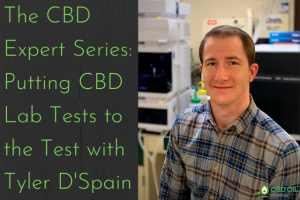
The CBD Expert Series: Putting CBD Lab Tests to the Test with Tyler D'Spain
Read More

MasterChef Nick Nappi's CBD Apple Cider Donut Hole Recipe
Read More
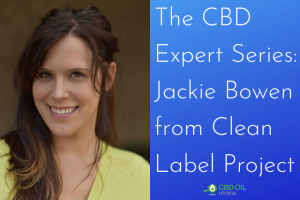
The CBD Expert Series: Jackie Bowen from Clean Label Project
Read More

The CBD Expert Series: Certificates of Analysis 101 with Dustin Jones
Read More
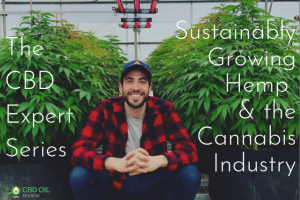
The CBD Expert Series: Sustainably Growing Hemp & the Cannabis Industry
Read More
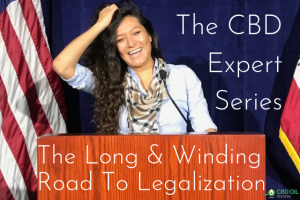
The CBD Expert Series: The Long & Winding Road To Legalization
Read More
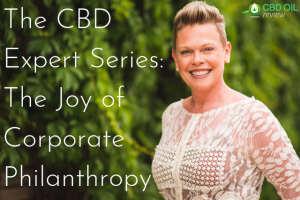
The CBD Expert Series: The Joy of Corporate Philanthropy
Read More
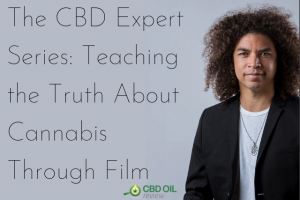
The CBD Expert Series: Teaching the Truth About Cannabis Through Film
Read More
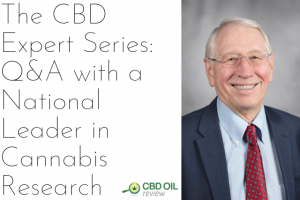
The CBD Expert Series: Q&A with a National Leader in Cannabis Research
Read More

The CBD Expert Series: Sexual Health and Pleasure with Sex Educator Kiana Reeves
Read More
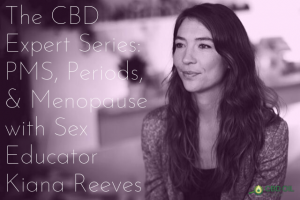
The CBD Expert Series: PMS, Periods, & Menopause with Sex Educator Kiana Reeves
Read More
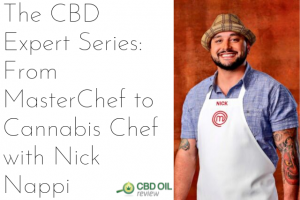
The CBD Expert Series: From Masterchef to Cannabis Chef with Nick Nappi
Read More
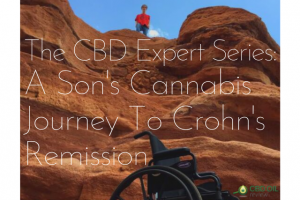
The CBD Expert Series: A Son's Cannabis Journey To Crohn's Remission
Read More
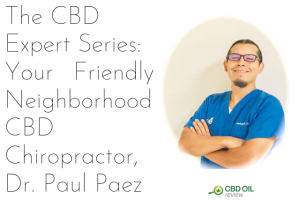
The CBD Expert Series: Your Friendly Neighborhood CBD Chiropractor, Dr. Paul Paez
Read More
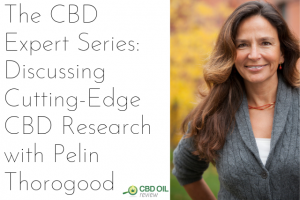
The CBD Expert Series: Discussing Cutting-Edge CBD Research with Pelin Thorogood
Read More
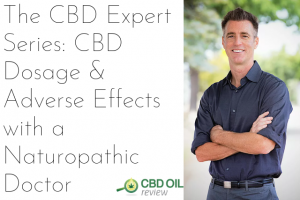
The CBD Expert Series: CBD Dosage & Adverse Effects with a Naturopathic Doctor
Read More

The CBD Expert Series: Talking Drug Tests with a Lab Tech
Read More
Opinions expressed in this article are those of our guest (the interviewee) and not necessarily of CBD Oil Review.
6 Smart Questions to Ask BEFORE You Buy CBD
Get the Ultimate CBD Buyer’s Guide and you won’t look at CBD the same way again!



 search
search